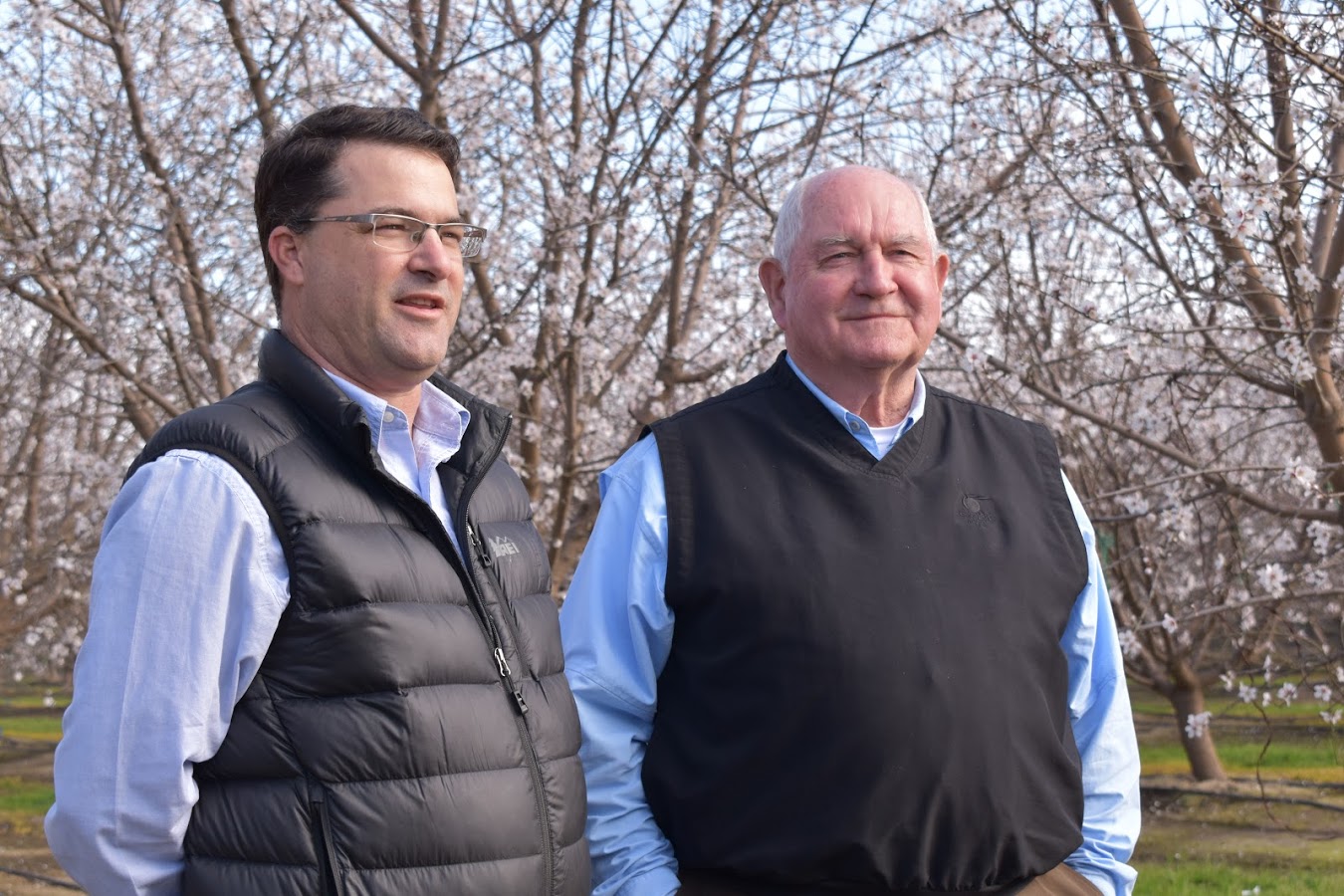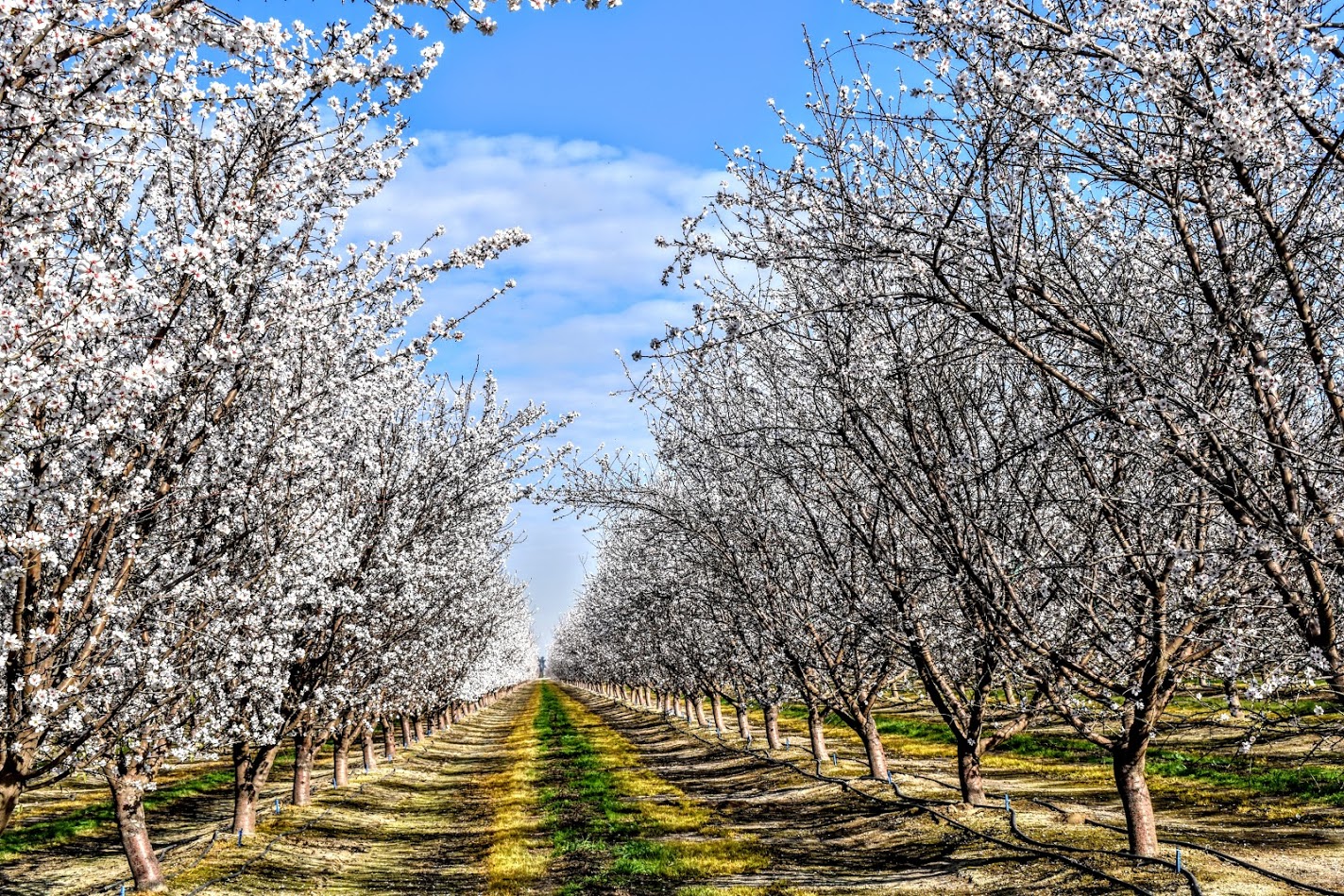Sonny Perdue gets hands-on while touring Giacomazzi Almond Orchards in Hanford, California
It’s true that he travels in presidential style, with motorcade and bodyguards. But when the U.S. Secretary of Agriculture toured Dino Giacomazzi’s almond orchards in February, it soon became clear that Sonny Perdue is no elite, out-of-touch D.C. figurehead.
“What I like about Secretary Purdue is that he’s a real farmer and a veterinarian,” said Giacomazzi, “and he understands agriculture from the ground up.”
 Dino Giacomazzi and U.S. Secretary of Agriculture Sonny Perdue in the orchard. (Photo courtesy of Jackie Giacomazzi)
Dino Giacomazzi and U.S. Secretary of Agriculture Sonny Perdue in the orchard. (Photo courtesy of Jackie Giacomazzi)
Following his opening day presentation at the World Ag Expo in Tulare, California, Perdue visited several farming operations in California’s Central Valley — including Giacomazzi’s Almond Orchard, a 160-acre farm in nearby Visalia.
Giacomazzi learned of the Feb. 14 visit weeks in advance due to the required background check. Security agents even gave his trees the once-over.
He was eager to show Perdue his latest water conservation improvements and technology advances. “I wanted him to see how we’re using water intelligently to produce something of value — protein from almonds — and how we’ve invested in technology that gives us the most yield, using the least resources,” he said.
Perdue commiserated with Giacomazzi on the challenges of being an early technology adopter. “I’m still new to almond farming, and there’s a real learning curve,” Giacomazzi said.
For the first few years, Giacomazzi lived in fear of making a fatal mistake and losing his trees. But the Almond Short Course offered by University of California Division of Agriculture and Natural Resources provided the fundamentals he needed. “I studied everything I could get my hands on and took advice from other farmers and the Almond Board, too,” he said.
 Giacomazzi Almond Orchards. (Photo courtesy of Jackie Giacomazzi)
Giacomazzi Almond Orchards. (Photo courtesy of Jackie Giacomazzi)
Giacomazzi said his almond farming is informed by his experience as a dairy farmer. He cares for each individual tree the way he cares for each cow on his dairy farm.
These days, Giacomazzi is focused on refinements, like improving nitrogen and water efficiencies in his orchard. His automated irrigation system, which waters trees by soil type, clearly piqued Perdue’s interest.
“He was very interested in the fact that we use soil science to make irrigation decisions,” said Giacomazzi, who uses soil mapping to customize tree irrigation by soil type and variety. His system also customizes watering parameters for Nonpareil and pollinator varieties during the drying process leading up to harvest. “The computer sorts it all out for us,” he said.
Perdue was so impressed by Giacomazzi’s progressive practices that he tweeted about his tour: “Fascinating discussion about using better conservation methods and less water at Dino Giacomazzi’s (almond) orchard.”
Giacomazzi also arranged for Perdue to visit his almond processor, the Harris Woolf Almond Co. in Coalinga. There, Perdue hand-sorted almonds, spoke with employees and learned about industry challenges, including trade issues. As Giacomazzi said, “He got the complete almond experience, from the soil to the bin.” And he didn’t stick to a script — or to his planned itinerary.
At the end of the visit, Giacomazzi mentioned his family’s 1,000-cow dairy farm, now in its 125th year of operation — and that his 104-year-old grandmother still lived next to the original barn. At that, Perdue insisted on visiting the dairy and meeting the family matriarch.
“He strolled into my 80-year-old flat barn and began attaching the milking machines to the cows,” said Giacomazzi. Then, Perdue went next door to visit with his grandmother. “She told him how she milked cows until the night she got married,” said Giacomazzi.
Giacomazzi was encouraged by Perdue’s genuine interest in the farming life, and by his committed advocacy for industry research, food programs, crop insurance and more.
“I’m convinced that he is a champion for California agriculture,” Giacomazzi said. “I think he gets what we’re doing and that he cares about what happens here.”